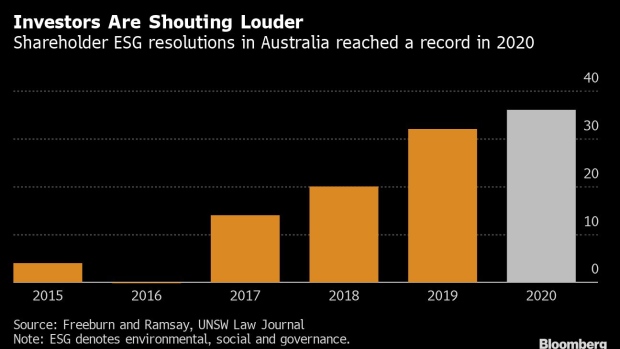Jun 1, 2022
Old-Guard Boardrooms Ambushed by New Era of Australian Activism
, Bloomberg News

(Bloomberg) -- Australia’s old-guard corporate directors are getting schooled on climate action and accountability -- as they exit the boardrooms.
Half the board at one of Australia’s biggest polluters, AGL Energy Ltd., said Monday they’d step down in a strategic capitulation to a billionaire climate activist. A day later, the head of one of the nation’s biggest banks was heckled by a 15-year-old over its climate goals. And at least four Star Entertainment Group Ltd. directors have said they’re quitting, ahead of a damning report into the company’s flagship Sydney casino.
Australia’s male-dominated cohort of chairmen and non-executive directors has long been accused of failing to keep management in check, and of serving each other as much as shareholders. Now -- days after Australia voted out a conservative government for reasons including inaction on corruption and climate change -- there are signs corporate Australia is getting the message.
“It is a new world,” said Brynn O’Brien, executive director of the Australasian Centre for Corporate Responsibility. “Either take the blame or face a humiliating vote against you.”
AGL’s decision to scrap a plan that involved running its coal-fired plants for another two decades may be a turning point in a country that’s one of the world’s biggest per-capita polluters.
The opposition campaign by AGL’s biggest investor, Atlassian Corp. co-founder Mike Cannon-Brookes, drew insurmountable support from other shareholders. In doing so, Cannon-Brookes exposed the divide between the board’s view on how to respond to a warming planet and that of the company’s owners. At 42, the technology tycoon is a generation younger than most of the directors.
“There’s been a shift in sentiment,” said O’Brien. “Investor sentiment is thoroughly on the side of looking for opportunities to decarbonize.”
With AGL reconsidering its strategic future, the stage is set for similar face-offs between emboldened shareholders and boards over emissions at a raft of businesses. “Corporate Australia will be watching with great interest,” the Governance Institute of Australia said in an e-mailed statement.
More than one quarter of Australian company directors don’t believe their board is capable of adequate climate governance, according to a December study by the Australian Institute of Company Directors. Almost half of them don’t know how to get a better grip on the issue, according to the study, which was based on more than 2,000 respondents and interviews with senior non-executive directors.
While AGL Chairman Peter Botten and CEO Graeme Hunt are stepping aside, taking responsibility for the company’s climate-policy misfire, immediate accountability hasn’t previously been Australia’s strong suit.
In 2020, then-Rio Tinto Group Chairman Simon Thompson stuck by CEO Jean-Sebastien Jacques for weeks in the face of public outrage after the mining company destroyed two ancient Aboriginal heritage sites. Jacques remained at the company for the rest of the year. Thompson took ultimate responsibility in 2021, but didn’t leave until 2022.
Seven West Media Ltd.’s billionaire Chairman Kerry Stokes and his board in 2017 comprehensively supported then-CEO Tim Worner after his extra-marital affair with a female colleague, and amid concerns of poor corporate governance. Worner led the television broadcaster for a further 2 1/2 years.
A watershed moment came in February last year, when a public inquiry found the nation’s biggest casino operator Crown Resorts Ltd. wasn’t fit to hold a Sydney casino license. While Crown CEO Ken Barton resisted for a few days, he and almost the entire board quit in rapid succession. That set a precedent for boardroom clean-outs in response to overwhelming evidence of governance or operational shortcomings.
The departures haven’t stopped. Star Entertainment CEO Matt Bekier resigned in March, days into a similarly scathing public investigation into the gaming company. Chairman John O’Neill followed him last month.
“I’ve been around the governance world for about 10 years and we’re seeing more accountability,” said Rachel Waterhouse, CEO of the Australian Shareholders’ Association. “You’ve seen an understanding among board members that change is required.”
©2022 Bloomberg L.P.


